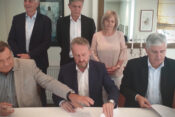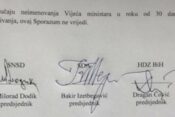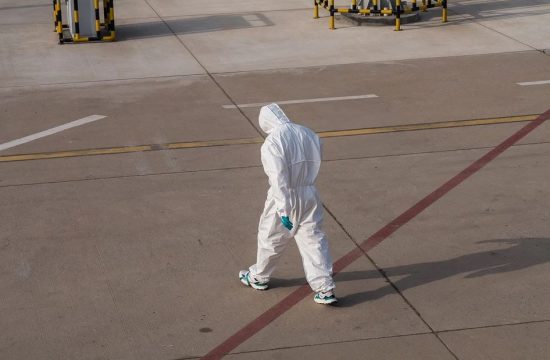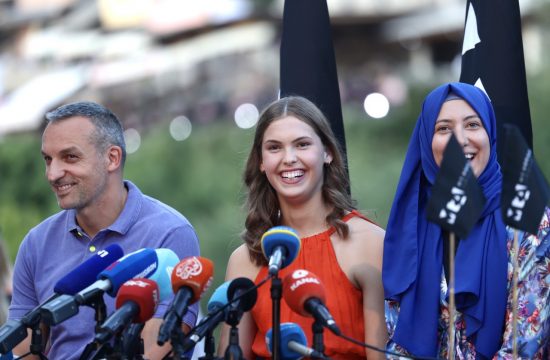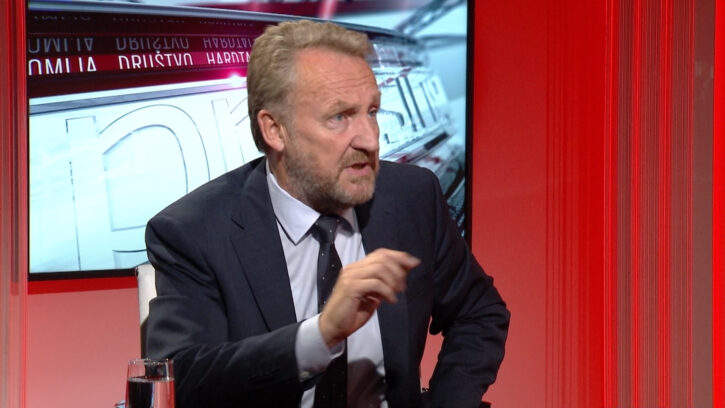
Bosnian Serb leader Milorad Dodik thinks that global developments are going in his favour and he wants to dominate, but he should change his behaviour as the Party for Democratic Action (SDA) will never back down from its demand to respect the law regarding obligations toward NATO, Bosniak leader Bakir Izetbegovic told N1 on Wednesday.
“It is time to tell Dodik ‘enough’. There will be a Bosnia and Herzegovina, there will be rule of law and the Constitution will be respected,” Izetbegovic stressed, as he spoke about the political crisis which resulted in Bosnia not forming a new government since the October 2018 election.
The reason behind the government – officially called the Council of Ministers – not being formed is that the Bosniak and Croat members of the tripartite Presidency refuse to vote for the new prime minister, who is supposed to come from Dodik’s Alliance of Independent Social Democrats (SNSD).
Although Dodik’s party initially agreed to Bosnia progressing toward NATO membership, they changed their minds in recent years and now oppose any new step in that direction to be made.
The next step would be sending the Annual National Programme (ANP) to the alliance in Brussels and the Bosniak and Croat Presidency members insist on it. They argue that the country took on that obligation years ago and must fulfill it according to the law and the Constitution.
In order to overcome the deadlock, the leaders of the three parties which won the election – Izetbegovic from the SDA, Dodik from the SNSD, and Dragan Covic, from the Croat Democratic Union (HDZ) – signed an Agreement containing principles for forming the government.
However, the main issue – Bosnia’s relationship with NATO – was never clarified and Izetbegovic and Dodik gave completely different statements about what the Agreement said regarding it.
The one-month deadline for implementing the principles expired on September 5, but no progress was made. Bosnia’s previous government is currently in a technical mandate until the new one is formed.
Izetbegovic said the SDA is “waiting for the SNSD to mature” so they can move the country forward together.
“We cannot do that without the SNSD. We will stay in the technical mandate until they mature – until they begin respecting the law,” he said.
Although international community officials repeatedly urged Bosnia’s political leaders to form the government, Izetbegovic said that no foreign ambassador ever pressured him on the issue.
“No ambassador dared to say anything. Nobody said we were making a mistake,” he said.
The leaders of Bosnia’s strongest ethnic parties are often accused of blocking the country from moving forward.
Izetbegovic expressed a different view.
“There are not three people who are causing problems, but one who is causing problems for 10-15 years already,” he said, referring to Dodik.
He added that Croat leader Dragan Covic sometimes joins Dodik in his efforts, while the Bosniak side “asks for nothing other than to act according to the Constitution and the law.”
He said Dodik must “learn how to behave” and change his “attitude toward others.”
“He was doing well for the past couple of years, global developments were going in his favour, it got to his head,” Izetbegovic said.
Dodik recently said that if the government is not formed by September 5, the parliament of the Serb-majority semi-autonomous part of the country, Republika Srpska (RS), will organise a session where it will discuss declaring all decisions which are not strictly in accordance with the 1995 Dayton Peace Agreement invalid.
This would mean that the RS would try to strip away the competencies of bodies that were established at the state level after the peace agreement, such as the joint state-level Armed Forces, the state-level tax office, the state court, police agency and others.
“Some things fell into place for Dodik and he is convinced that he can implement some things, even secession,” Izetbegovic said of the Bosnian Serb leader who has for years been advocating for the RS to secede from Bosnia.
“The relations with NATO, Brexit in Europe, the strengthening of Asian and eastern countries, all of it has given him the impression that he can dominate and that he thinks he can get more than what belongs to him,” Izetbegovic said.
“But sooner or later – and it would be better if this happened sooner – everything will have to be cleared up with Dodik,” he said.
According to the Bosniak leader, the political crisis is “not only an issue of the NATO path or the ANP, but an issue of dominance, dictatorship, ultimatums, of unacceptable behaviour.”
“And we are supposed to give a person who behaves in that way a position in Bosnia’s Council of Ministers and accept him destroying barriers and the rule of law?” Izetbegovic asked.
He also said that Dodik was ready to accept a compromise at some point but that “reactions in the RS pushed him to reject it.”
Bosnian Serb political representatives, both those in power and those from the opposition, are traditionally opposed to NATO because the alliance launched airstrikes against the Bosnian Serb forces during the 1992-95 war and against the Serbian military in 1999 during the conflict between Belgrade and ethnic Albanians in Kosovo.
Izetbegovic said that the article of the August 5 agreement which mentions Bosnia’s relationship with NATO has prompted the international community – which he said “has been asleep” – to get engaged.
He said the international community stopped paying attention to Bosnia for a while and that this resulted in, among other things, Bosnian Serb leadership awarding convicted Bosnian Serb war criminal Radovan Karadzic and insulting the High Representative – the international official named to oversee the civilian implementation of the 1995 Dayton Peace Agreement.
“Now the moment of truth is approaching,” he said, asking whether the US and the Peace Implementation Council – a group of representatives of countries overseeing Bosnia’s peace process – will allow for “new chaos to be caused in the Balkans?”
“I think they won’t. This Agreement made them rethink everything,” Izetbegovic concluded.

